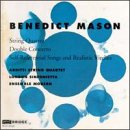The Good - Enough Contemporary Music
jive rhapsodist | NYC, NY United States | 03/23/2010
(3 out of 5 stars)
"Is it Benedict Mason's fault that this disc is not amazing? I heard something great on the radio that made me order this CD. I think the thing I heard was a lot more interesting than the music here, but who knows for sure? There's a nice String Quartet with lots of kind of "There's some nice music, and then it's made to turn distorted and weird" action. Well, I prefer that to Post - Minimalism, although I'm aware that that's very faint praise. I guess all the parts that sound like rowing and all the parts that sound like fiddling could somehow be situated within a history of English Music - or maybe not. Things get exciting for a while, then they stop being exciting. There's a definite idea of how History and Tradition could be used creatively here, but it doesn't really make its point completely. It all reminds me of an OK visit to a Modern Art museum. You see all of these folks whose work is almost as captivating as Mark Rothko's, or Cy Twombly's, or James Rosenquist's or Philip Guston's or, or, or...
ALMOST as captivating...Almost, but not quite...
Next comes a Double Concerto for Horn and Trombone. I might call this piece a little too self - consciously "wacky". Again, it's very good. Lots of cartoon-y "almost falling off the rails" music. A kind of skewed Ragtime - y time feeling that evokes the world of the Ligeti Piano Concert to some extent. Nothing not to like, but nothing to change my life. But I want to ask the question - exactly what is it that's missing? Can this ineffable something be named? I hate the word "genius" - it's lazy. Lazy language. I hate lazy language. Maybe the cleverness gets in the way. In the way of what? Maybe it's meant to be clever. A clever disquisition on fragmentation. We don't denigrate Mozart's Concertos because they're "fun", do we? So what if this piece is fun?! Anyway, we're all out here hustling, trying to say our thing. And Mason's a very, very skillful composer who's learned lots of lessons about gesture. This piece isn't dry and boring, nor does it pander. So...? It reminds me of the Brice Marden retrospective at MOMA. I guess I'll leave it at that.
Last, but not least...
A Song Cycle. More wackiness right from the top. Maybe Ligeti's not an influence, but his late works come to mind. All those piccolos and high harmonics and horn calls. What can I tell you? Mason's probably one of the best composers out there right now. I should probably rate this disc more highly. But it's like this: when I want to listen to Wolpe (let's say), it's because I really want to listen to Wolpe. The fact that so much of his language comes from the 12-Tone Masters doesn't change the fact that he has a unique voice, strong and different from the others. That's what I'm not quite getting here in terms of Mason's relationship to his milieu. I'll try again with another disc at some point.
3 1/2 Stars"


 Track Listings (16) - Disc #1
Track Listings (16) - Disc #1